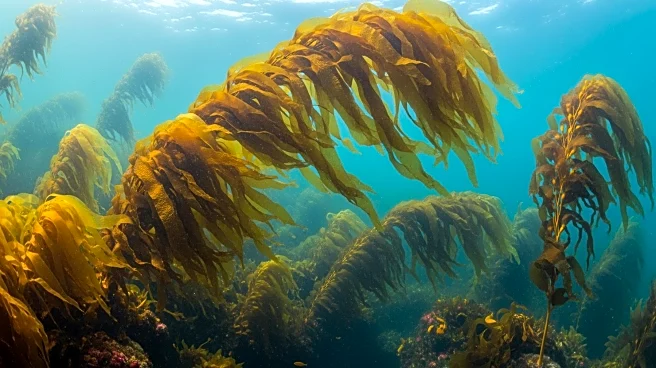What's Happening?
A study on kelp productivity along the Western Australian coast has revealed that traditional restoration methods may lead to a 16% decline in productivity under mid-century ocean warming conditions. The
research, conducted across three locations, measured kelp productivity using the 'hole-punch method' and assessed environmental drivers such as temperature, photosynthetically available radiation, nitrate availability, and chlorophyll concentration. The study found that temperature plays a significant role in impacting kelp growth. Assisted adaptation scenarios showed potential to enhance productivity by approximately 9% under future conditions. The study highlights the importance of understanding environmental relationships to inform restoration and adaptation strategies.
Why It's Important?
Kelp forests are vital marine ecosystems that support biodiversity and provide economic benefits through fisheries and tourism. The decline in kelp productivity due to ocean warming poses a threat to these ecosystems and the services they provide. Understanding the environmental factors affecting kelp growth is crucial for developing effective restoration and adaptation strategies. Enhancing kelp productivity can help mitigate the impacts of climate change on marine ecosystems and support sustainable economic activities.
What's Next?
Further research is needed to refine assisted adaptation strategies and explore their applicability in different regions. Collaboration between scientists, policymakers, and stakeholders is essential to implement effective restoration projects. Monitoring and modeling efforts should continue to assess the long-term impacts of ocean warming on kelp forests and inform adaptive management practices. International cooperation may be necessary to address the global challenge of ocean warming and its effects on marine ecosystems.
Beyond the Headlines
The study raises broader questions about the resilience of marine ecosystems in the face of climate change. It highlights the need for integrated approaches that consider ecological, economic, and social dimensions. Ethical considerations regarding the conservation of marine biodiversity and the rights of communities dependent on these ecosystems may also arise.








